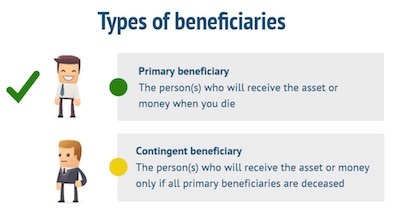What is a contingent beneficiary of an estate or an account

So you want to find out what is a contingent beneficiary. A contingent beneficiary is a person or entity who is nominated to receive an asset upon another person’s death if the primary beneficiary who has been designated cannot inherit the asset, such as when the primary beneficiary has predeceased the person who granted the asset, refuses to accept the asset, or cannot be located.
Contingent beneficiaries are normally designated in assets where beneficiaries are allowed, such as insurance policies, IRAs, annuities, and 401ks. Contingent beneficiaries are also named in wills. Understanding what is a contingent beneficiary includes knowing that a contingent beneficiary can only exist together with a primary beneficiary.
For example, John is married to Linda, and they have children, Tom and Mike. John’s life insurance policy names his spouse, Linda, as the beneficiary. However, lawyers always recommend the nomination of a contingent beneficiary so that in case the primary beneficiary is unable to receive the asset for any reason, the asset will be given to a person the insured designates. In this case, John can designate his children, Tom and Mike, to receive equal shares as contingent beneficiaries, so in case Linda predeceases John or for some other reason refuses to accept or fails to receive the insurance proceeds, the asset would then go to Tom and Mike 50%-50% as contingent beneficiaries. If John does not name any contingent beneficiary and Linda predeceases John, the insurance proceeds would go to John’s estate.
To know what is a contingent beneficiary in a will, the following example provides an illustration. In the same family scenario, John writes a will designating his spouse, Linda, as the beneficiary of his remainder estate. A provision in the will would state something similar to, “I give, devise, and bequeath to my spouse, Linda, all the rest, residue and remainder of my estate, whether real, personal or mixed of whatsoever kind.” To designate a contingent beneficiary in the will, John would include a provision, stating, “If my spouse, Linda, does not survive me, I give, devise and bequeath all the rest, residue, and remainder of my estate to my children, Tom and Mike, in equal portions each.” In this case, Tom and Mike are contingent beneficiaries in a will who stand to inherit the remainder estate in case Linda predeceases John.
If John did not name a contingent beneficiary and Linda predeceases John, the remainder estate would be distributed under the state laws of intestacy because the will does not provide for a qualified beneficiary for the remainder estate.
For this reason, it is recommended that a person designate several contingent beneficiaries, who are listed in a specified order. This ensures that someone the person has designated will always be available to receive the asset.
Contingent Beneficiary vs. Contingent Remainder Interest
Some people confuse a contingent remainder interest with what is a contingent beneficiary. A contingent remainder interest is a future interest that depends on the happening of an event. In the above case, if John states in his will, “I give, devise, and bequeath $100,000 to Tom if Tom is married.” Tom has a contingent remainder interest of $100,000 from John’s estate. If Tom is not married by the time John dies, Tom is not entitled to $100,000, and this amount goes back to John’s remainder estate.
A contingent remainder interest is not what a contingent beneficiary is. A contingent beneficiary completely inherits, without condition, when the primary beneficiary cannot. A beneficiary of a contingent remainder interest can only inherit upon the happening of certain conditions. A contingent remainder interest can be used in wills, but it is normally used in trusts.
If you are interested in finding out more about what is a contingent beneficiary, we at the Law Offices of Albert Goodwin, are here for you. We have offices in New York City, Brooklyn, NY and Queens, NY. You can call us at 212-233-1233 or send us an email at [email protected].













